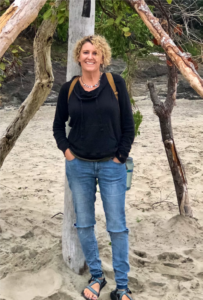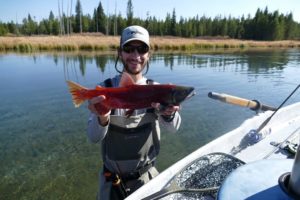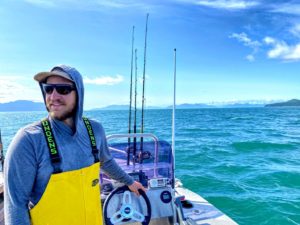IT IS TIME TO VOTE – VICE PRESIDENTIAL AND STUDENT REPRESENTATIVE CANDIDATES
The election for 2022-23 Vice President of the Western Division AFS is finally here! Voting is open from now until April 30th and can be completed at: https://forms.gle/fKBhKzaybP8b4FUD8. All WDAFS members are eligible and encouraged to vote for the Vice-President.
The Student Representative shall be elected by a majority of ballots cast only from students in good standing with either a recognized Student Subunit or Chapter within the Division. Voting is open from now until April 30th and can be completed at: https://forms.gle/fKBhKzaybP8b4FUD8.
Please vote!
Julie Meka Carter – Vice-President Candidate
 Background
Background
I am honored to be considered as a potential nominee for Vice President of the Western Division of the American Fisheries Society (AFS). My calling to pursue a career in wildlife and fisheries biology began in high school with a dream of working with wildlife and people as a Peace Corps volunteer. After receiving my B.S. in Biology with an Emphasis in Wildlife and Fisheries Management in 1995, I served in the Peace Corps Kazakhstan as a Non-governmental Organization (NGO) Advisor for a fish and wildlife NGO and it was a life changing experience. I decided to focus on the field of fisheries science because of my love of trout inspired by growing up fishing in the Little Colorado and Black rivers in Arizona. My first professional job was working as a fisheries biologist for the USGS Alaska Science Center in Anchorage conducting research on salmonids, primarily Rainbow Trout on the Alagnak River in Katmai National Park, and I earned my M.S. in Fisheries Science at the University of Alaska Fairbanks.
My passion for native salmonids brought me back to Arizona in 2005 and I spent many years working on Apache Trout and Gila Trout conservation as the Native Trout Coordinator with the Arizona Game and Fish Department (AGFD). In 2016, I promoted to the Statewide Native Aquatics Program Manager position and managed the native fish program (35 species and most are federally threatened or endangered), a multi-million dollar conservation and mitigation program, and served as the rotenone project planning lead. In early 2021, I became the Aquatic Wildlife Branch Chief and currently oversee multiple programs at the statewide and regional levels that are dedicated to the management and restoration of sport fish and native fish populations. These include a native fish program, sport fish stocking program, operation and fish production at six hatcheries (and two more in development), assessment and enhancement of aquatic habitats, management and containment of Aquatic Invasive Species, fish health monitoring, and water quality monitoring. One of the most challenging but rewarding aspects of my job involves navigating the balance between managing native aquatic species while also providing sport fishing opportunities for the public. It isn’t easy! But I advocate for both and we are currently implementing various strategies in Arizona to meet these dual mandates.
One of the highlights of my career to date has been serving in a leadership capacity with two National Fish Habitat Partnerships (NFHP), the Western Native Trout Initiative (WNTI) and Desert Fish Habitat Partnership. Most notably, I have been a Steering Committee member of WNTI since 2008 and it’s Chair since 2014; I am proud to be part of such an impactful organization.
AFS Involvement
The first professional presentation I gave was at the annual meeting of the Arizona/New Mexico Chapters of the American Fisheries Society and The Wildlife Society as an undergraduate student and I’ve been a member of AFS for 23 years. The AGFD and USGS were strong proponents of my participation in AFS and that involvement has been an integral part of my professional development and identity as a fisheries manager. Over the course of my career I’ve attended, presented, and/or chaired many symposia at state, Western Division, and society level AFS meetings, fully taking advantage of the interactions with mentors and colleagues while a student, an early career biologist, and at present. These opportunities, whether virtual or in-person, continue to provide countless exchanges for scientists and managers with similar interests and specialties and highlight the benefits of AFS membership. I served as President of the Arizona/New Mexico Chapter in 2010-2012, was program chair at chapter meetings for many years, and served as the chapter’s Miles McInnis Scholarship chair for undergraduate and graduate students. At the society level, I am the president-elect of the Fisheries Management Section, on the Mote Fellowship Committee, and a member of the Fisheries Administrative Section, Introduced Fish Section, Fish Habitat Section, and Fisheries Management Chemicals Committee. After almost two years of virtual meetings due to COVID, I attended the AFS meeting in November 2021 in-person and seized every networking opportunity and conversation with colleagues as possible. It was amazing!
Vision
If elected to this role, the promotion and demonstration of the relevancy of the Western Division and society to students and young professionals would a key focus of mine. Recruiting and retaining this suite of individuals in AFS is crucial. The AFS provided a pathway within this field that started when I was an undergraduate student and I would like to pay it forward. I would continue the efforts to expand the engagement, membership, and professional development at all levels of the society, with a focus on the bridge and cross-pollination between student sub-sections, chapters, the Western Division, and the society. The passage of the ACE Act (NFHP), Infrastructure Bill, the Great American Outdoors Act, and the potential future passage of the Recovering America’s Wildlife Act provide increased prospects to leverage funding through partnerships for on-the-ground conservation for fish and wildlife in the west and across the country. These funding opportunities are and will be game changers in the fields of fisheries science, management, and conservation. I would explore ways for the Western Division to play a role in promoting partnerships, advocating, and highlighting successes using annual meetings, symposia, and other avenues. I would continue to support and develop the efforts to increase diversity, equity, and inclusion within the society and our profession – it is our collective future.
Thank you for your consideration and I hope that I can serve the Western Division and its members in this capacity!
Student Representative Candidates
 Candidate Name: Jack McLaren
Candidate Name: Jack McLaren
Email: jack.mclaren@usu.edu
Institution: Utah State University / Henry’s Fork Foundation
Statement: I am running for WDAFS student representative to strengthen services and representation for students in the Western Division. The COVID-19 pandemic has created fantastic opportunities for virtual engagement that benefit students but also presents important challenges. At both national and local AFS meetings, hybrid formats–while important for a variety of reasons–have negatively impacted in-person attendance and increased overall costs. This has negatively impacted important in-person interactions that drive the high-quality networking, mentoring opportunities, and diversity programs that are so important for students intending on advancing their careers. As WDAFS student representative, I’ll make sure our response to the pandemic and the increase in virtual services will better address student needs. More about me: I am an Ecology PhD student in the Department of Watershed Sciences and the Ecology Center at Utah State University. I work with Dr. Phaedra Budy and the non-profit Henrys Fork Foundation in Idaho to study the effects of water supply and water quality on river and reservoir ecosystems and fish habitat.
Candidate Name: Andrew Suchomel
 Email: drew@suchomel.com
Email: drew@suchomel.com
Institution: Brigham Young University
Statement: I loved being a part of the American Fisheries society as an undergraduate student for four years. During that time, I served as the president of the Brigham Young University-Idaho student subunit from 2019-2020. I gained experience working with the Idaho Chapter AFS executive committee in addition to coordinating the volunteer service at the Idaho Chapter annual meeting in Coeur D’Alene. I received awards from the Idaho Chapter including an undergraduate scholarship, a student training and opportunity grant, and a distinguished service award. I can bring the experience I have working with the Idaho Chapter executive committee to the Western Division as the student representative. As the Western Division student representative I feel it is important to be inclusive of all students and their research. While not everyone’s research is the same research among undergraduate or graduate students, I think there can be more collaboration that occurs among students in the American Fisheries Society. My objective as the student representative will be to increase the scientific communication among students in the Western Division. If we can establish a network of communication that can bring together people that are doing similar research, there will be more collaborations that can generate some awesome science that comes out of our students!
Currently, I am a MS student at Brigham Young University where I study evolutionary ecology. My research revolves around using stable isotope analysis to study the food web dynamics in the marine environment in southeast Alaska. I am particularly interested in the application of stable isotope to ecology and recently I have become fascinated by mechanisms that facilitate coexistence and community assembly.

